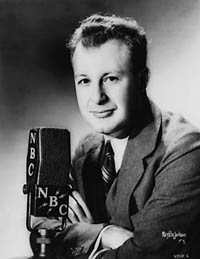 I've found a little gem in this book by Clifton Fadiman. Most of you who have been reading in this world even just a little bit longer than I have are probably already familiar with The Plan, but in case you're not, I'll introduce it to you.
I've found a little gem in this book by Clifton Fadiman. Most of you who have been reading in this world even just a little bit longer than I have are probably already familiar with The Plan, but in case you're not, I'll introduce it to you.Fadiman was a personality in the 40's and 50's in print and on television and radio, mainly for his opinions about books and reading. He wrote book reviews for The New Yorker, chose books for the "Book of the Month" club, and hosted a show called "Information, please!" He was asked to write a little plan for the average American, choosing the best books from 100 of the best authors, which was published as this little book, The Lifetime Reading Plan.
I was immediately struck by Fadiman's gentle wit and pleasant style of writing when I read the introduction -- it was like sitting in on a very fine lecture on the pleasure of reading good books. He humbly admits that any very well read person could make up such a plan, and that many other authors might be suggested or added to his list, and he would not argue about that -- if there are others you like, please, read them!
Fadiman gives short bios of each of the 100 authors, followed by a bit of a plot line and concrete reasons why the modern American should gain by it's reading. "Why should you read Dante?" he asks in the introduction "Jane Austen? Lucretius? Voltaire? Because they are great? That is no answer. Their greatness is what we feel after we have read them, often years after. I have tried to give a more concrete, less lofty answer to a natural and proper question."
He gives this tip on how to tackle difficult books: "If you try a book, say Hobbe's Leviathan and find it too difficult, put it aside for a year or so. Then take it up again. You will find that the other books you have read in the meantime will somehow have made Hobbes a little easier. That is one of the miracles of this kind of reading: each original communication helps us to extract a bit more from all the others."
Fadiman also lectures on our approach to reading: "Reading is not a passive experience, except when you're reading trash or the news. It should be and is, one of the most vigorous modes of living. A good book, like a healthy exercise, can give you that pleasant sense of fatigue that comes of having stretched your mental muscles."
The plan is not meant to be a checklist which earns you a bachelor's degree when you have completed it. Fadiman is clear about his intention "I would like you to feel The Lifetime Reading Plan as an exciting adventure of the mind, as well as a discipline. If I have communicated to you any of my own enthusiasm, you are ready to sit down for a lifetime of conversation with some of the liveliest talkers our civilization has produced." If these books are not enjoyed, then reading them is vanity.
I have always liked to hear reading spoken of as a conversation between the reader and writer. Choosing a book is often choosing a new friend -- not just in the characters, but behind them their author. Fadiman nods to that concept in the book's dedication: "For Mortimer J. Adler who first taught me, and has never ceased teaching me, how to listen to the Great Conversation."
If you're wondering, How to Read a Book by Adler is #99 in The Plan.

1 comment:
It has been so true in my life that books I once felt too difficult I can read much easier today. I have never heard it mentioned as he did, that every book you read allows you to glean more from other books! Cool incentive to read more.
Post a Comment